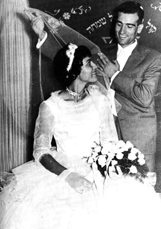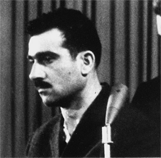- Home |
- About |
- Contact Us |
- RSS
Eli Cohen - Mossad Spy
Went undercover in Syria for Israeli military intelligence
Died: May 18, 1965 -- Damascus, Syria

In 1947 Cohen attempted to enlist in the Egyptian army to avoid paying a tax that Egypt levied on Jews but he was declared ineligible from the army after his loyalty had been challenged. In 1949 his family including his mother, father and brothers all moved to Israel. Cohen remained to study electronics and finish up his degree.
During this time he worked on Jewish and Zionist activities--In 1955 he was given "intensive espionage training" by Israel--including helping to smuggle Jews into Israel from Egypt as part of Operation Goshen. He was also purportedly involved in the Lavon Affair, where Israeli military intelligence organized a campaign bombing American and British military facilities and making it look like it was perpetrated by Egyptians. This was an attempt to weaken Egypt's relationship with the western powers. During this period Cohen was arrested and harshly interrogated over his activities.
In 1956 after the Suez Canal Crisis, Cohen along with all of Alexandria's Jews were expelled as suspected Zionist agents and he embarked for Israel. Once there, Cohen met Nadia Majald, an Iraqi Jew whom he married in 1959. They would eventually have three kids together.

In 1960 Cohen was recruited into the Mossad after having been rejected from trying to join the agency two times earlier. At an earlier evaluation Cohen was said to possess "a high IQ, great bravery, a phenomenal memory, and the ability to keep a secret; but the tests also showed that 'in spite of his modest appearance, he has an exaggerated sense of self-importance,' and 'a lot of internal tension.' Cohen, the results indicated, 'does not always evaluate danger correctly, and is liable to assume risks beyond those which are necessary.'" This last portion of his evaluation would prove to be prescient as later events would show.
Now, however, finding that Cohen was exactly the type of recruit the Mossad needed, someone who spoke English, French and Arabic and possessed Arabic features, he soon became a katsa (field agent). The ultimate goal of Cohen's service was to gather intelligence around Syria.
To make good on his cover, in 1961 he was sent to live in Argentina, adopting the name Kamel Amin Thaabet. His "legend" was that he was a wealthy Argentinian businessman of Syrian descent who ultimately wanted to return back to Syria. Since Cohen was from Egypt and his real family had in fact emigrated from Syria, he could more easily portray an Arab although he needed to learn to speak Arabic with a Syrian rather than an Egyptian accent.
During the year he spent in Argentina as a "social butterfly" he was able to hob knob with many Syrian politicians and diplomats, including future Syrian president, Amin al-Hafez, who led Syria's first Ba'athist regime and whom Cohen was able to befriend.
In 1962 he moved to Syria where he entertained officials with plenty of "booze and women." He became a frequent host to Syrian high society. Often times loose-lipped because they were intoxicated (Cohen didn't drink but pretended to be drunk) Syrian officials leaked a lot of sensitive information to him. He was also shown around classified military locations. All of this information he would transmit back every few days to the Mossad using a hidden radio transmitter.
In 1964 Cohen relayed back to Israel that Syria planned to divert much of Israel's drinking water away from Lake Kinneret. With that information, the Israeli Air Force was able to bomb the equipment that was being used to divert the water.
Cohen also visited Syrian defense positions in the Golan Heights. Although only senior military leaders were allowed there, the highly trusted Cohen was brought along. While there Cohen suggested that planting trees would provide cover and shade for the troops. The Syrians agreed and this information was what the Israeli Air Force used to find the location of troops during the Six Day War when it was attempting to regain the Golan Heights.
Cohen would only return back to Israel three times during these years and on his last trip home in 1964 he requested that his handlers let him come back permanently from his mission as he believed he had been "made" by the new commander of intelligence, Colonel Ahmed Su’edan. Unfortunately for him, the Israelis, convinced him to return to Syria. It turned out he had been correct.

Some argue that his espionage skills were not quite up to snuff and that he ignored his handlers instructions to vary the time of day of sending the transmissions as well as to reduce the frequency of his messages. With the help of Russian technical advisers, his transmissions to Israel were discovered by the Syrians. On January 24th, 1965 he was arrested in the middle of a radio transmission.
Cohen was imprisoned and tortured. He was denied any defense and despite an international campaign to have him released and appeals from political leaders, diplomats and even Pope Paul VI, he was ultimately executed by hanging in front of a crowd of 10,000 people.
His remains were never recovered. To this day many streets, and neighborhoods in Israel are named after him.
- In 2019, Netflix released a six part mini series called The Spy about Cohen's exploits as a spy starring Sacha Baron Cohen.
- While Cohen was undercover all his wife Nadia knew of his mission was that he was working for the Israeli Ministry of Defense.
- The location of Cohen's body is still a secret to this day.
- In May 2005 it was revealed that The Mossad had plans to name a building in its compound after Cohen.
- In May 2018 The Mossad recovered the watch Cohen wore up until his arrest. The watch was returned to his widow, Nadia in a private ceremony.
Some of these sites were used as source material for this entry and may be of interest to those looking to learn more about this person/topic.
- Jewish Virtual Library - Eli Cohen (1924 - 1965)
- International Fellowship of Christians and Jews - The Spy Who Helped Win the Six-Day War
- BBC News - Israel recovers hanged spy Eli Cohen's watch from Syria
- Haaretz.com - Double Agent's Widow Offers New Take on Eli Cohen Affair
- The Telegraph - Mossad's master of deception: the astounding true story of Israeli super-spy Eli Cohen
- Encyclopedia Britannica - Eli Cohen - ISRAELI SPY
- My Jewish Learning - ISRAEL HISTORY - Eli Cohen - Israel's most famous and successful spy.
- Jewish News - The real story behind 'The Spy,' Sacha Baron Cohen’s new Netflix series
- The Guardian - Amin al-Hafez obituary
SEE ALSO
 Copy the text below to cite your paper or article:
Copy the text below to cite your paper or article: 

